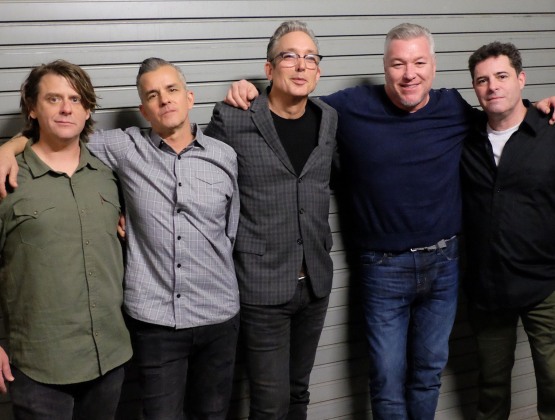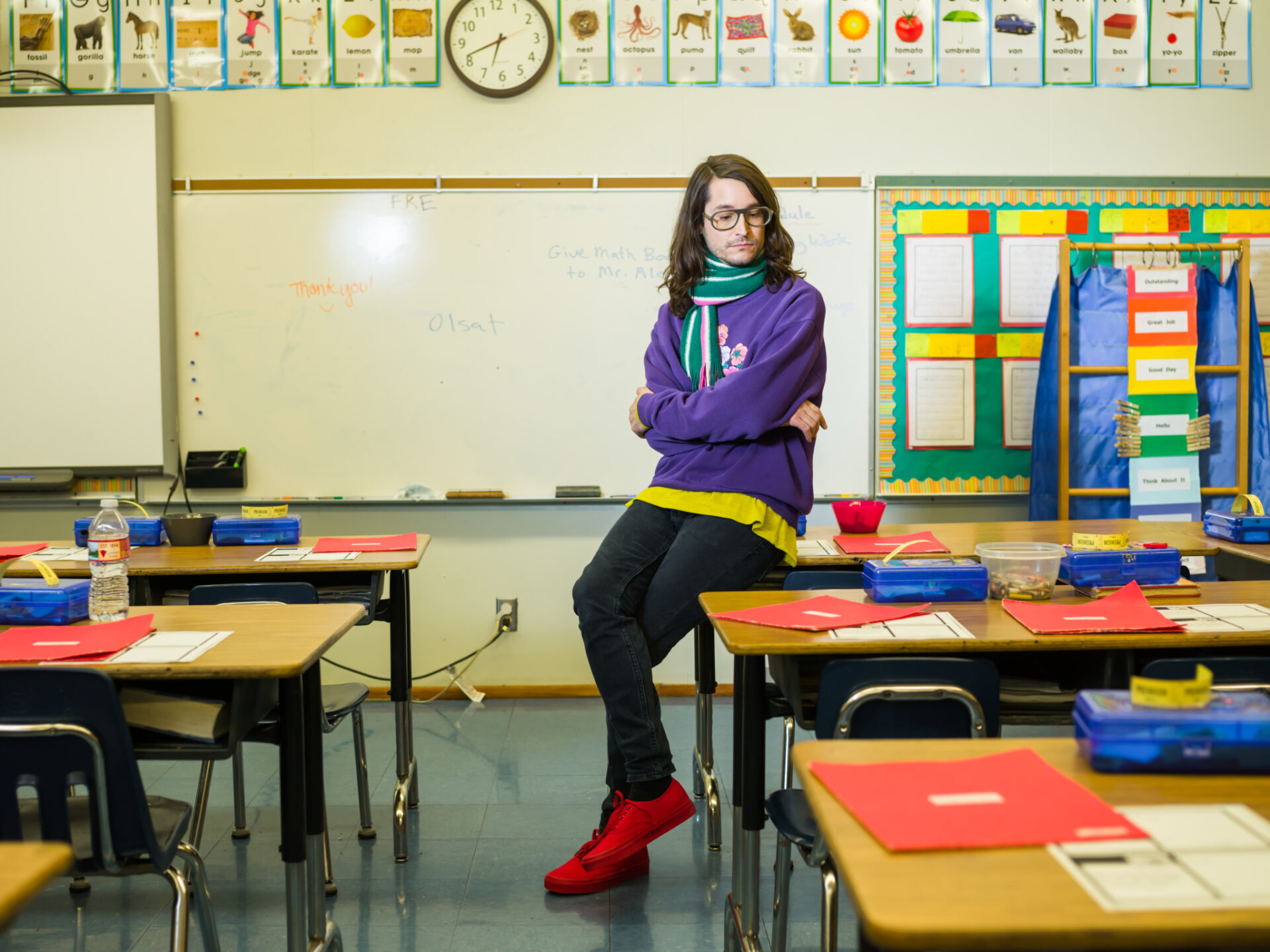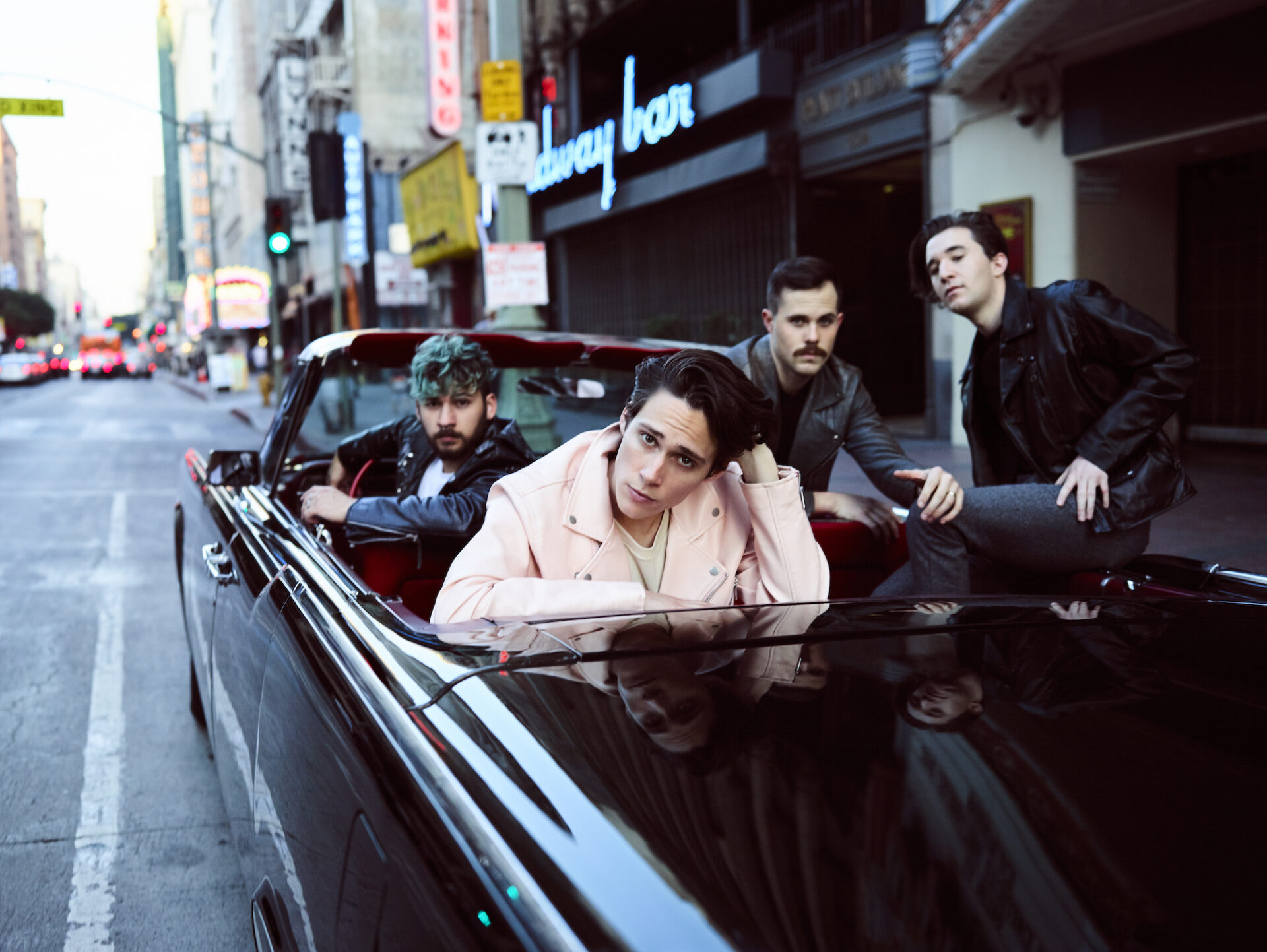Alternative artist Jordan Benjamin, better known as Grandson, has just announced the release of his new album Death of an Optimist and dropped the music video for the first single, “Dirty.”
Known for his bringing awareness to the issues of climate change, voter oppression, and basic human rights, Jordan had the chance to discuss all of these things along with his new album in a deeper context.
Substream: Due to being in the middle of a pandemic right now and everything is a little weird, why do you think that it’s important for artists to be releasing new content? Grandson: I think that there are many valid arguments to be made, that it’s not necessarily important, especially in the ways in which politics are becoming more and more mainstream to talk about. With all of the conversation revolving around the future of America in regards to social justice as it relates to this sort of stand against fascism- there’s lots of evidence to argue that any amount of information that dilutes the conversation right now is only getting in the way. I know I personally do struggle with that, with feeling conflicted. But ultimately when I think about the amounts of support I’ve gotten through the years from fans-all of the conversations I’ve had on tour I know what this project and this community means to me and to those that I have had the chance to meet already. I don’t think they’re necessarily mutually exclusive. I look at what we do as entertainers our role is to help give you an opportunity to recharge that battery, that ultimately you take with you as you navigate all this uncertainty and anxiety that this year is full of. I think that is how I frame my work. I’m trying to provide a soundtrack for which you can move forward and continue to do this very uncomfortable and confrontational work. I think every one of us has a responsibility right now and you can’t completely ignore the moment to pump your next single release, I think that would be kinda bullshit. As long as your using that audience and platform, encouraging people to confront what is going on in the world, whether that means registering to vote, getting tested for Coronavirus…all those things are valuable and I wouldn’t be able to exercise that influence if I weren’t kind of continuing to build this momentum, digitally, though releasing music and music videos.
Substream: and with that, you have the XX Resistance Fund, what pushed you to do that? It’s so important especially with everything going on.
Grandson: It was always really challenging for me to dedicate my time to make my voice heard if I didn’t feel that it was going to leave behind some sort of residual impact that would be good for the world. I come from a family with progressive values, I have family members that are in activism and in spaces of organizing and community building so when I started finding any momentum as a musician, our family dinner conversations centered around “well what are you going to do about it?” So the Resistance Fund became…initially when I was a little bit more naive I set out to start a non-profit, and what I found was, the face of non-profit organizations is very difficult to make positive headway if you’re not full-time committed to the growth and direction of whatever that is. And frankly, that almost plays into old stereotypes where the actor or musician thinks they know what’s best for the world, you know? When I set out to stress what’s important to me as far as climate change, voter registration, youth empowerment, all of these causes that are very important to me, they have been fought for and defended by real-life heroes, long before I showed up to the conversation. When I started the Resistance Fund the aim was merely to amplify those voices, give other people a chance, and when looking at things like meet and greet opportunities on tour, music videos, there is a lot of space for a percentage of those resources to go towards making a positive impact. People want to do good, My songs are about, change, a lot of them. A lot of them are about holding onto hope, finding agency in your life, those words would ring a little bit more hollow if I weren’t substantiating them with effort in making those impacts felt not just in your headphones, but in the streets.
Substream: With this new album release, The Death of an Optimist, where did you come up with the title?
Grandson: So The Death of an Optimist was the product of a lot of different titles. At first, it was just called “Optimist,” or “The Dilemma of an Optimist,” the album itself tells the story of one person struggle at a crossroads of whether to continue having hope for their future. Which I think many of us are struggling with today and it’s very personal to my having toured around the world now preaching change, preaching hope and optimism, in a very cathartic, maybe angry format. The underlying messages of so much of my music have been this theme of optimism and hope, and as I’m rolling out my debut album years later, it was really an opportunity to reflect on and confront “do I still have that optimism?” that my generation is going to be able to make any real headway into tackling these issues that we face, whether it’s climate change or gun violence, or whatever dominates the headline any particular day. There’s so much evidence to feel like “what the f***” did we even accomplish?” after all this tweeting and signing petitions and fundraising. I think that the conclusion I came to was that in order to make that change, we have to dispel the notion that somebody’s going to do it for us. Me sitting around telling you “have faith, this is going to get figured out” that needs to end now. You’re seeing that there has been encouraging signs as far as more young people being informed and having opinions more so than before, but the only way change is going to happen is unprecedented voter turnout and fundraising, and pressure on our publicly elected officials to push the conversation in a more progressive direction. I think that’s where this whole “Death of an Optimist” came from, it was kind of like in order to rise up to meet the moment, a part of ourselves needs to get left behind in the process. That’s where Death of an Optimist came from. Blind optimism doesn’t get us anywhere. There’s a song on the album called “We Did It” and it’s a very sarcastic, damning commentary on the bare minimum. Even just tweeting “F*** Trump” what is that really accomplishing? My sister’s spending her afternoon phone banking from Toronto to help get swing state voters to learn more about Joe Biden’s policies. The idea that it’s equivalent somehow, these two candidates standing for the same things is completely insane. You have a candidate pushing for the most progressive climate change platform of any major party candidate pretty much ever, you have a tax reform policy that would reflect The Great Depression, we haven’t seen stuff like that. So, was Joe Biden always about these sorts of progressive values? No. Does he change to meet what his voters are demanding? Yes. “We should elect that dude.” Me sitting around and retweeting articles that I’m not even reading or patting myself on the back for having integrity, but not caring enough to take that integrity and actually make positive change, that whole mentality needs to be confronted and left in 2020. We’re just not going to make these sort of changes with the urgency that we need. I think progress is being made but so is ignorance and hatred, fear, and stupidity…they’re like moving even faster. I think for us to grow, you just kind of have to karate-chop that optimist in the neck and get to work. It’s a confusing and complicated time. I wanted to make sure this debut album, could stand on its own through time and look back on it and recognize themes that lived before COVID-19 for instance, but it wouldn’t feel right to make an album that didn’t touch on this particular moment. I have always admired the artists whose work did reflect the times they were writing it.
Substream: What are more of some of the ongoing themes and messages throughout the album?
Grandson: Yeah, uh there’s a lot. The first half of the album speaks more to the optimism and the work that we are going to do. “Dirty” for instance is one of the more positive songs I might have ever released. It appeals to our common duty to work together to face these issues. If you don’t care enough to get involved for yourself, then do it for your neighbor who can’t. Then on the second half of the album, it gets much darker and it was much more difficult to write because I confronted a very real chance that all of this is for nothing with songs like “We Did It,” “World War III.” Things end on a somewhat optimistic note because there’s nothing else I could do that I would feel was a positive contribution to society. So it does end on agency, empowerment, and the opportunity each of us has to meet this moment. It’s definitely a journey to get there for sure.
When it comes to fans and takeaways from the album, Grandson comments, “That to me is the single thing that I am most proud of and would be most proud of. When I meet fans who have taken these sorts of themes and transfer them into their lives. It’s taken many forms over the years. I’ve seen fans who come to shows and say that they’ve used the soundtrack to do all kinds of things. Get out of abusive relationships, try to curb their addictions, unhealthy habits, even just working out and losing weight-whatever it is, I’ve watched real people on the other side of my phone take these songs I write with my friends and make a positive change in their life. Those sorts of impacts will be there long after my music and life are relevant. I am hopeful that if even one person, as cliche as it probably sounds, If I do make some sort of positive impact encouraging some people, then that is worth something. All throughout the year I did a collaborated acoustic project, I teamed up with HeadCount and the songs have accumulated over five million streams and the song titles have a resource for you to text to be notified for HeadCount’s election alert. I’ve really tried to explore different ways of making a positive impact and living up to what rock&roll should be all about. I hope that means something to someone.”
Substream: And you mentioned the song “Dirty,” tell me a little bit about the making of the music video. The B&W makes it seem like an old school crime put into a modern-day music video.
Grandson: There’s definitely a retro /nostalgia to that song in particular. As it plays on this up-tempo beat that drives the verses. It felt very Amy Whinehouse or OutKast…the black and white aesthetic has followed me throughout my career. It was a method where I wanted people to feel familiar with the music before they’d ever heard it. That was always the intention with the kind of grainy, black & white filter like you’re looking at a picture that you’ve already seen.
As far as this sort of crossroads that I spoke of, I wanted to personify those different roads that our lives could be led down as these two different characters. With the Grandson character and this other manifestation of my anxiety or my fears in this character “X,” each of the videos from this album has placed that antagonist in different positions of power that I have struggled with in my life, whether it’s a teacher or a religious figure, and in this particular video, he’s a politician.
It was just a really fun opportunity to take these same themes that I have expressed with such seriousness and dance a little, take the piss out of it, and let everyone be in on the joke laughing at me, because, again, it is exciting, it is fun to be part of something, to make a change, to stand up for what you believe in. I do actually enjoy that, it always doesn’t have to be so scary or consequential. I think that the video served to give people permission to take these things on and not feel like it’s on their shoulders to save the world.
I can’t tell you how fun it was to make. I’ve got blood coming out of my eyeballs and there’s dancing, I’m doing choreography…shit at the beginning of quarantine I couldn’t even imagine experimenting with. I had written most of the album between the months of January and March, I was planning on being on tour all year with all these visuals and this whole album was going to look and feel so different out of necessity. As I was about to go tour all over North America and Europe for the third year in a row, having the opportunity to stand still, as scary as it was, it made me confront “well what can I do to give myself that same rush? How can I go deeper creatively? And go even deeper in committing these themes in these songs, this project.” If there’s one thing I can leave people with it’s, you never regret those kinds of risks. Even if I would look back at those videos and think that I could’ve done something differently or even if none of them go viral, I got a lot out of it. I learned what I’m capable of and it’s always worth taking those chances. In this album, I think we took a lot of chances and I’m really proud of that and the team that pushed me to do that.
When it comes to creating an album right before the pandemic, Jordan says it consists of a lot of zoom calls. “I find myself even more glued to my phone than normal, which isn’t particularly healthy. When I spoke to my therapist once, I reflected on how we call to build an image of ourselves both intrinsically, and through what we see outside of ourselves, how we are received socially. Not being able to go on tour or see how physically these new songs have taken on meaning by my fans has been very challenging at times. I’ve had to dig deeper to derive that meaning because more often than not I would get that meaning from seeing kids know every word, and fashioning their own merch…I can’t wait to see people in the crowd with the X costume on or with the album art painted on their faces. I know those things are coming because I’ve already felt them and there’s nothing like it. Making al album without that I needed to trust that relationship that I’ve built over the years. Trust that it’ll be there when this is all over and give people something to look forward to at the end of each week. That’s been my main focus. It’s a lot of zoom calls and email chains, it’s a little more sterile but it feels like it’s coming at an even more important time because people need a distraction, people need a break. I look forward to getting it out there. When this is all over, there will be a whole new audience of people who found my music through COVID that I never even got the chance to meet yet, and I genuinely can’t wait for that. Although it’s not the same, the virtual meet & greets are still a nice reminder that the internet isn’t all bad. I’m not alone in doing this and none of us are. I’ve spent a lot of time before I go to bed thinking about when I get to go back on stage, take my shoes off and dig my in, and just be present with a room full of people. I just gotta not lose my sanity between now and then,”
To keep busy and distracted during this quarantine, Jordan and his girlfriend have binge-watched all of The Sopranos.
“On the last night, we dressed up as our favorite characters and ate a big Italian blowout dinner. Finding the little things worth celebrating has been a rewarding challenge.”
Whenever he and members of his community get down, he says. “I have this secret playlist I have been building full of house music, it’s like our emergency brake, and we all jam out really hard.”
Keep an eye out for more releases from Grandson later this fall.













